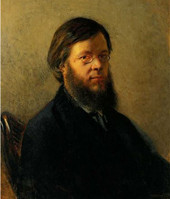
Birthday anniversary of Alexander N. Pypin, eminent philologist and historian, academician
March 25 (April 6), 1833, in Saratov, in the family of a noble, was born prominent Russian philologist, historian, ethnographer, Academician Alexander Pypin.
Alexander’s cousin on the maternal line was N. G. Chernyshevsky, with whom they were friends in childhood and adolescence. After graduating from high school in Saratov in 1849, Pypin entered Kazan University, but a year later he moved to the historical-philological faculty of St. Petersburg University. Soon he was recruited by a prominent philologist, I. I. Sreznevsky, to compile the "Dictionary of the Old Russian language." In 1853, Pypin graduated from the university with the thesis on Russian comedy of the 18th century. The same year he published his first work on a statesmen, writer and mason, V. I. Lukin.
In 1857 Pypin defended his master's thesis, "Essay on the literary history of ancient Russian tales and fables." A year after the defense, he went on a trip to Europe to prepare for an academic career, during which he visited France, Germany, Italy, talked with many men of literature and science, including P. V. Annenkov, V. P. Botkin, I. S. Turgenev. In 1860, Alexander was appointed extraordinary professor of St. Petersburg University in the Department of General History of Literature where he taught the course of medieval French and Provençal literature. But a year later, he resigned along with other professors in protest against the limitation of student rights and the activities of the Minister of Education E. V. Putyatin.
Soon Chernyshevsky introduced Pypin to the editors of the "Sovremennik" journal. There Alexander until 1866, together with N. A. Nekrasov, managing editor. After the closure of "Sovremennik" Pypin cooperated with M. M. Stassyulevitch and his "Vestnik Evropy", where he became deputy chief editor and leading author of the literary-critical department. In 1871, Alexander was elected a corresponding member of the Academy of Sciences, but this election was not approved by the Minister of National Education, D. A. Tolstoy.
In the 1870-1880's, Alexander Nikolayevich published numerous papers on the history of literature, biographies of prominent literary and public figures. One of the most important of his works was the "Review of the history of Slavic literatures," which covered the history of literature of the southern and western Slavs from ancient times to the mid 19th century. In the late 1890's, Pypin published his four-volume study, "The History of Russian literature." In this work he described the development of Russian literature from the earliest written monuments to N. V. Gogol. In addition to the general issues of the development of literature, Pypin paid great attention to the outstanding work of the individual writers and critics – V. G. Belinsky, N. A. Nekrasov, M. E. Saltykov-Shchedrin, M. Yu. Lermontov. In addition, Pypin was one of the first researchers of the Old Russian apocryphal literature.
As a historian, Alexander was known primarily as a researcher of social movements in Russia in the beginning and middle of the 19th century. These issues were covered in his fundamental works "Social Movement in Russia under Alexander I» and «Essays on literature and the public in the reign of Alexander I and the era of Nicholas I». In these works Pypin described political processes, issues of censorship and the development of public opinion in the country in 1820-1850's. In addition, numerous Pypin’s articles were devoted to the history of Freemasonry in Russia, which, in the early 1870s, were brought together in the "Russian Freemasonry. 18th and the first quarter of the 19th centuries. Historical essays."
Alexander Nikolayevich was also known for his translations, mainly of the works by Western historians, critics and philologists. In 1891, Pypin became a corresponding member of the Academy of Sciences, Department of the Russian language and literature, and in 1898 - a full academician.
Alexander N. Pypin died November 26 (December 9), 1904 in St. Petersburg, at the age of 71.
Lit.: Пыпин А. Н. Белинский, его жизнь и переписка. СПб., 1908; Он же. История русской литературы: В 4 тт. СПб., 1911-1913; Он же. История русской этнографии: В 4 тт. СПб., 1890-1892; Он же. История славянских литератур: В 2 тт. СПб., 1879-1881; Он же. Мои заметки. Саратов, 1996; Он же. Н. А. Некрасов. СПб., 1905; Он же. Характеристики литературных мнений от двадцатых до пятидесятых годов: исторические очерки. СПб., 1909; Балыкин Д. А. А. Н. Пыпин как исследователь течений русской общественной мысли. Брянск, 1996; Барсков Я. Л. Список трудов академика А. Н. Пыпина, 1853-1903. СПб., 1903; Веселовский А. Н. А. Н. Пыпин. СПб., 1905; Пыпина В. А. Чернышевский и Пыпин в годы детства и юности. Саратов, 1928.
Based on the Presidential Library’s materials:
Пыпин А. И. Русское масонство: XVIII и первая четверть XIX в. СПб., 1916;
Пыпин А. Н. История русской литературы. Т. 1: Древняя письменность. СПб., 1898;
Пыпин А. Н. Общественное движение при Александре I. СПб., 1871;

